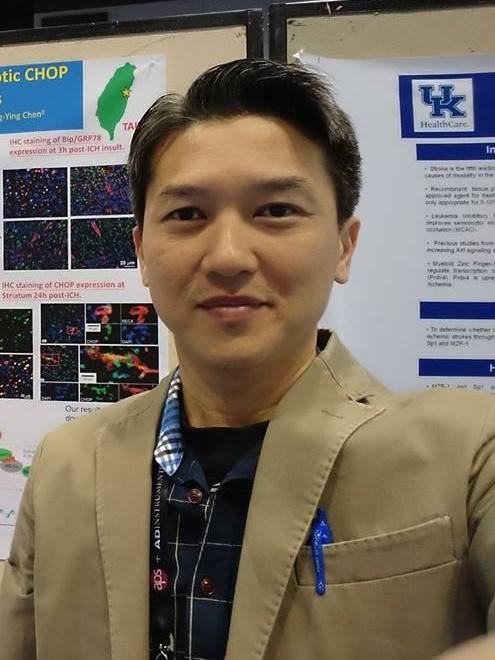 |
Dr. Liew, Hock-Kean | |
| E-mail:hockkean@tzuchi.com.tw | ||
| Ext:15911 | ||
| National Defense Medical College, Taiwan. Ph.D. | ||
|
Expertise:System Biology, Neuroscience,Biomaterial & Scaffold, Brain Injury |
Interest:
| Ischemic stroke is a major cause of morbidity and mortality worldwide. To date, no effective treatment is available to reverse the brain damage due to the difficulty to regenerate the matured neuron lost. Over the past few years, though the brain injury platform that we created (cerebral ischemic and cerebral hemorrhagic model), we are trying to establish new drugs and methods to reduce the neurological injury after brain injury. We demonstrated that G-CSF, urocortin and the Neural progenitor cells (NPCs) might possess beneficial effects against brain injury. Recently, our study focus on the combination of urocortin and the NPCs to treat cerebral ischemia. NPCs are considered the ultimate lineage precursors to all neuronal and glial cells. Because of their ability to self-renew, NPCs have promise for treatment of neurological diseases by transplantation therapy, and has been shown to promote recovery of neuronal functions after stroke. However, the disruption of the tissue architecture after brain injury limits the transplant efficacy. Besides, only a small proportion of grafted cells survived in the ischemic brain and rare differentiation to mature neurons. This massive loss of stem cells and rare differentiation to mature neurons post-engraftment is an impediment that lessens the effectiveness of cell transplantation therapy. Urocortin (UCN), a 40 amino acid peptide, which was first identified in rat midbrain. The function of this neuropeptide is to regulate neuroendocrine, autonomic, and immunologic responses to stress. Our results showed that, preconditioning with UCN conferred cytoprotection on NPCs and promoted their differentiation in an in vitro ischemia/reperfusion model. Therefore, we intended to clarify the role of UCN in modulating the NPCs survival, differentiation and the therapeutic efficacy of transplanted NPCs after chronic cerebral I/R injury. This study will provide a new insight into the potential of UCN by increasing survival and neuronal differentiation of transplanted NPCs, to repair the adult brain after chronic ischemic stroke in the future. |
Publication (in five years):
|
1. |
Liew HK, Cheng HY, Huang LC, Li CW, Peng HF, Yang HI, Lin PB, Kuo JS, Pang CY*. Acute Alcohol Intoxication Aggravates Brain Injury Caused by Intracerebral Hemorrhage in Rats. Journal of Stroke and Cerebrovascular Disease, 2015 Sep 16. pii: S1052-3057 (15) 00457-7. |
|
2. |
Liew HK, Huang LC, Yang HI, Peng HF, Li KW, Tsai AP, Chen SY, Kuo JS, Pang CY*. Therapeutic effects of human urocortin-1, -2 and -3 in intracerebral hemorrhage of rats. Neuropeptides. 2015 Aug;52-89-96. |
|
3. |
Liew HK, Kuo JS, Wang JY*, Pang CY*. Granulocyte-colony Stimulating Factor Increases Cerebral Blood Flow via a NO Surge Mediated by Akt/eNOS Pathway to Reduce Ischemic Injury. Scientific World Journal, 2015;2015:657932. |
| 4. |
Huang HY, Chiu TL, Chang HF, Hsu HR, Pang CY, Liew HK, Wang MJ*. Epigenetic Regulation Contributes to Urocortin-Enhanced Midbrain Dopaminergic Neuron Differentiation. Stem Cells, 2015 May;33(5):1601-17. |
| 5. |
Chuang JY, Liew HK, Pang CY, Kuo JS*. Size-controllable striatal lesions for evaluation of neuroprotective agents in rats. Tzu Chi Medical Journal 2013 March; 25(1):23-28. (Equal First) |
| 6. |
Liew HK, Hsu CW, Wang MJ, Kuo JS, Li TY, Peng HF, Wang JY*, Pang CY*. Therapeutic benefit of urocortin in rats with intracerebral hemorrhage. J Neurosurg. 2012 Jan;116(1):193-200. |
| 7. |
Liew HK, Pang CY, Hsu CW, Wang MJ, Li TY, Peng HF, Kuo JS, Wang JY*. Systemic administration of urocortin after intracerebral hemorrhage reduces neurological deficits and neuroinflammation in rats. J Neuroinflammation. 2012 Jan 19;9:13. |
| 8. |
Liew HK, Hsu CW, Kuo JS, Pang CY*. Granulocyte-colony stimulating factor reduces striatal dopamine accumulation caused by cerebral ischemia. Tzu Chi Medical Journal 24(2012)181-185. |
| 9. |
Yang KL*, Lee JT, Pang CY, Lee TY, Chen SP, Liew HK, Chen SY, Chen TY, Lin PY. Human adipose-derived stem cells for the treatment of intracerebral hemorrhage in rats via femoral intravenous injection. Cell Mol Biol Lett. 2012 Sep;17(3):376-92. |